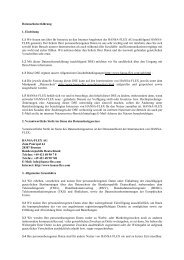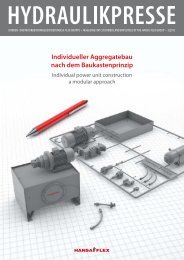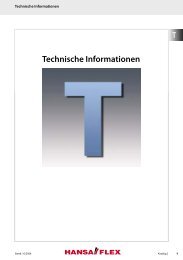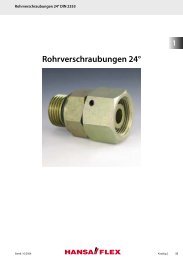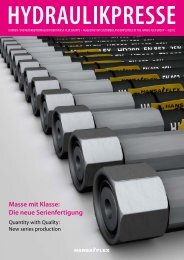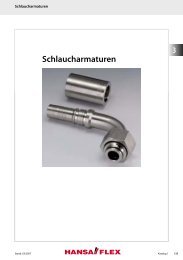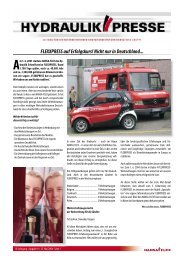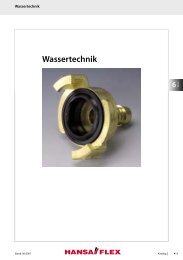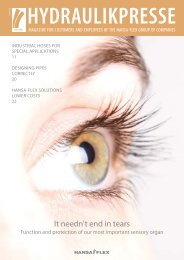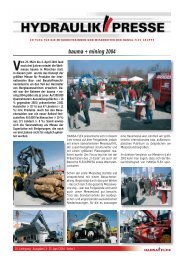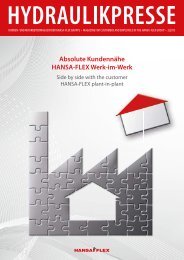Absolute Kundennähe HANSA-FLEX Werk-im-Werk
Absolute Kundennähe HANSA-FLEX Werk-im-Werk
Absolute Kundennähe HANSA-FLEX Werk-im-Werk
Erfolgreiche ePaper selbst erstellen
Machen Sie aus Ihren PDF Publikationen ein blätterbares Flipbook mit unserer einzigartigen Google optimierten e-Paper Software.
ARBEIT & LEBEN WORK & LIFE<br />
WORK & LIFE ARBEIT & LEBEN<br />
Foto/Photo: Bundesministerium der Finanzen (www.zoll.de)<br />
Foto/Photo: iStockphoto<br />
Ob am Flughafen oder auf der Straße: Zollkontrollen sind bei jedem Grenzübertritt möglich.<br />
At the airport or on the road: customs inspections are possible at every border crossing.<br />
VORSICHT VOR DEM ZOLL<br />
CAUTION, CUSTOMS<br />
Wer Waren aus dem Ausland einführen möchte, muss die jeweiligen<br />
Zoll- und Einfuhrbest<strong>im</strong>mungen kennen.<br />
Viele empfinden den Zoll und seine Kontrollen als lästig, insbesondere Urlaubsreisende.<br />
Doch der Zoll schützt die Wirtschaft vor Wettbewerbsverzerrungen, die<br />
Verbraucher vor mangelhaften Waren aus dem Ausland und die Bevölkerung vor<br />
grenzüberschreitender Kr<strong>im</strong>inalität. In Deutschland hat der Zoll mehr als 40.000<br />
Beschäftigte, verteilt auf über 250 Zollämter. Er hat allein 2011 rund 123 Milliarden<br />
Euro eingenommen. Seine Hauptaufgabe ist die Bekämpfung der Wirtschaftskr<strong>im</strong>inalität<br />
– von der Produktpiraterie bis zur klassischen Steuerhinterziehung.<br />
Ebenso ist er unter anderem <strong>im</strong> Verbraucherschutz, der Terrorismusbekämpfung<br />
sowie bei Verstößen gegen Artenschutzbest<strong>im</strong>mungen tätig. Darüber hinaus ist<br />
der Zoll die Inkassoorganisation des Bundes. Denn er kann bei Zollkontrollen an<br />
der Grenze und <strong>im</strong> Inland ausstehende Forderungen ausländischer Schuldner eintreiben.<br />
Insgesamt nahm der Zoll <strong>im</strong> Jahr 2011 auf diesem Wege fast 1,2 Milliarden<br />
Euro für den Staatshaushalt ein.<br />
FREIGRENZEN NICHT ÜBERSCHREITEN<br />
Vor allem für Reisende gibt es viel zu beachten. Denn oftmals wird <strong>im</strong> Urlaub<br />
gehörig eingekauft, schließlich lassen sich mitunter vielversprechende Schnäppchen<br />
machen. Ganz gleich, ob in den USA erworbene Textilien, in Japan erstandene<br />
Elektronik oder in Italien gekaufter Wein: Man sollte sich stets informieren,<br />
wie viel von den jeweiligen Gütern abgabenfrei in das eigene Land eingeführt<br />
werden darf. Zwar gibt es innerhalb der Europäischen Union keine Zollgrenzen<br />
mehr. Daher dürfen Waren, die für den persönlichen Verbrauch best<strong>im</strong>mt sind,<br />
grundsätzlich abgabenfrei mitgebracht werden. Es gibt allerdings Grenzen, ab<br />
wann diese nicht mehr zollfrei eingeführt werden können. Reisende aus Nicht-<br />
EU-Ländern dürfen, wenn sie per Flugzeug oder Schiff unterwegs sind, Waren<br />
bis zu einem Wert von 430 Euro unbehelligt einführen. Für Bahn- und Busreisende<br />
sowie Autofahrer gilt die Freigrenze von 300 Euro. Liegt der Warenwert über<br />
dieser Freigrenze, müssen sie verzollt werden. Wird der Freibetrag überschritten,<br />
fallen 19 Prozent Umsatzsteuer sowie der jeweilige Warenzollsatz, der von zwei<br />
bis 15 Prozent variiert, an.<br />
g<br />
Anyone who intends to <strong>im</strong>port goods from abroad must be thoroughly<br />
familiar with the applicable customs and <strong>im</strong>port regulations.<br />
Many of those affected, particularly holidaymakers, look upon customs and the<br />
associated inspections as a nuisance. But customs protect the economy from distortion<br />
of competition, consumers from substandard goods from abroad, and the<br />
population from transnational cr<strong>im</strong>inality. In Germany, the Customs Administration<br />
employs over 40,000 staff at more than 250 customs offices. In 2011 alone,<br />
it earned over 123 billion euro. The pr<strong>im</strong>ary objective of the Customs Administration<br />
is to combat economic cr<strong>im</strong>e – from product piracy to classic tax evasion. It<br />
also serves to protect consumers as well as combating terrorism and preventing<br />
violations of species protection provisions. And it is the debt collector for the German<br />
Federal Republic. It is empowered to collect unpaid receivables from foreign<br />
debtors both inside the country and at customs checkpoints at the border. In 2011,<br />
the Customs Administration added almost 1.2 billion euro to the domestic budget<br />
this way.<br />
DO NOT EXCEED DUTY-FREE LIMITS<br />
There is a lot to remember, especially for people who are travelling. Because holidays<br />
abroad are often the occasion for carefree shopping, after all, the chances of<br />
finding great bargains are good. Whether these are items of clothing purchased<br />
in the USA, electronics in Japan or wine in Italy: But you should always find out<br />
what quantities of the goods in question can be <strong>im</strong>ported into your home country<br />
without paying customs duties. It is true, customs borders no longer exist within<br />
the European Union. As a result, in general products that are intended for personal<br />
use can be brought home without incurring any customs payments. But there are<br />
l<strong>im</strong>its above which even these items cannot be <strong>im</strong>ported entirely free of charge.<br />
Individuals travelling by air or sea from non-EU countries can bring goods up to a<br />
value of 430 euro into the EU without payment. For visitors travelling by rail or bus,<br />
and those driving cars, the customs-free l<strong>im</strong>it is 300 euro. If the value of the goods<br />
they are bringing in exceeds this l<strong>im</strong>it, customs duty must be paid on them. If the<br />
duty-free allowance is exceeded, the goods are subject to 19 per cent VAT as well<br />
as the applicable customs duty rate, which varies from two to 15 per cent.<br />
Although these two general travel allowances apply, many goods may only be<br />
<strong>im</strong>ported in l<strong>im</strong>ited quantities regardless of their value.<br />
THE FOLLOWING GUIDELINES APPLY<br />
• Within the EU, individuals may bring with them either 800 cigarettes, or 400<br />
cigarillos, or 200 cigars or one kilogram of tobacco. On the other hand, if they are<br />
travelling from a non-EU country they are l<strong>im</strong>ited to either 200 cigarettes, 100<br />
cigarillos, 50 cigars or 250 g smoking tobacco.<br />
• Within the EU, individuals may bring with them either ten litres of spirits, or ten<br />
litres of flavoured alcohol beverages, or 20 litres of intermediate products such as<br />
fortified wine or vermouth, or 90 litres of wine or up to 110 litres of beer. For those<br />
travelling from a non-EU country, one litre of spirits, two litres of sparkling or fortified<br />
wine, four litres of non-sparkling wine or 16 litres of beer are duty-free.<br />
• Within the EU, ten kilos of coffee are permitted. Individuals travelling from non-<br />
EU countries may bring with them 500 grams of coffee or 200 grams of coffee<br />
extracts, essences or concentrates.<br />
• Individuals arriving from non-EU countries may bring technical goods with a<br />
value up to 300 euro into the EU duty-free.<br />
• It is also permitted to <strong>im</strong>port 50 grams of perfume and 0.25 litre eau de toilette.<br />
• Travellers both inside and outside the EU may bring up to 10,000 euro in cash with<br />
them without having to declare it.<br />
• Fuel may only be <strong>im</strong>ported duty-free from an EU member state if the fuel is in the<br />
vehicle’s fuel tank or in a reserve tank on board the vehicle. However, the quantity<br />
that is carried should represent a reserve quantity – about 20 litres for a motor car,<br />
approx<strong>im</strong>ately 60 litres for a lorry.<br />
g<br />
36 2|2013 HYDRAULIKPRESSE<br />
Foto/Photo: iStockphoto<br />
HYDRAULIKPRESSE 2|2013<br />
37



